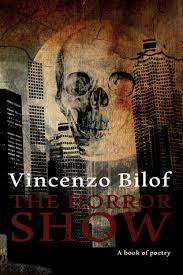
Vincenzo Bilof
Bizarro Pulp Press
ISBN 978-0615874845
September, 2013; $11.89 PB, $2.99 Kindle
Reviewed by Marvin P. Vernon
Here is the bare bones plot: A Nobel prize winning poet and his family has been missing for a while. The poet wanders dark streets and is friended only by a psychiatrist and a woman named Lorraine. The poet may have a murderous past and shows the symptoms of a severe psychosis. The doctor is caring for him but possibly has sinister motives himself. As the doctor delves deeper into the mind, the poet becomes more fragmented and dangerous.
But it is not the plot that is important when reading The Horror Show by Vincenzo Bilof. The author has created a novel in the form of a poetry collection. This is not the first time I’ve read a poetic horror novel. Toby Barlow’s Sharp Teeth uses free verse to tell its tale but it is fairly straightforward in its narration. The Horror Show is more of a conceptual experience. When I first started the book I went to my usual first instinct with poetry and read a few at random before reading it from start to finish. The poems work amazingly well this way but I don’t think this is how the author meant for them to be read. They are best read from beginning to end as you would a novel. Considering the emotional power of the poems when taken as a group I would recommend reading them one after the other in long sessions, if not all at once, to get the feel of the narration in this unsettling book. In fact, it is best not to try to follow the plot but to let the poems take you into whatever feelings that are elicited. In other words, go with the flow. This may be one of those very few novels where style successfully trumps plot. Bilof seems to be intentionally disorienting the reader and telling them that not even the pages of this book is necessarily a safe place for your mind. Some of the adjectives that came to mind while reading these uncomfortably beautiful poems included “psychedelic”, “creepy”, and “exquisitely psychotic”. It should also be noted that the author doesn’t flinch on the violence and gore. This is first and foremost a horror novel and a fairly extreme one at that.
Bilof’s conceptual experiment does not dilute the power and terror of its story. The three main characters come out quite real and developed considering they are immersed in poetry full of fragmented imagery and their thoughts expressed in a stream of consciousness. Inner thoughts and external reality become entwined adding to the reader’s feelings of confusion and terror, not unlike the ones our literary protagonists are experiencing. This is the type of novel that may not appeal to those who like their scares external and well explained, presented in a straight narration, and then safely tucked in at night. But if you like poetry and do not mind being dragged around in a literary soup of angst and dread then Bilof may have written your kind of nightmare.








